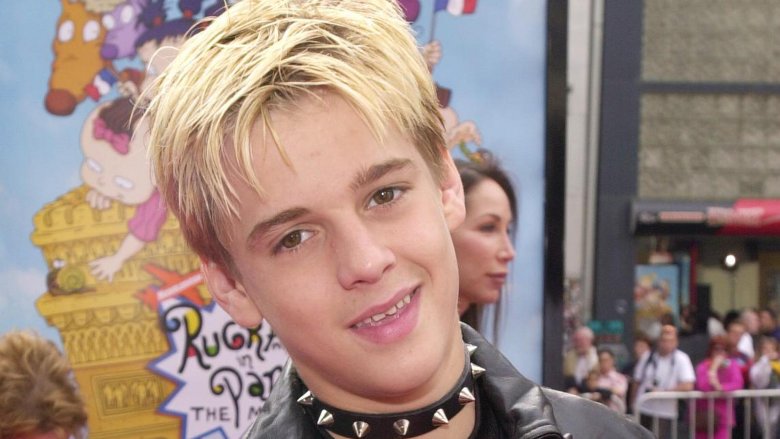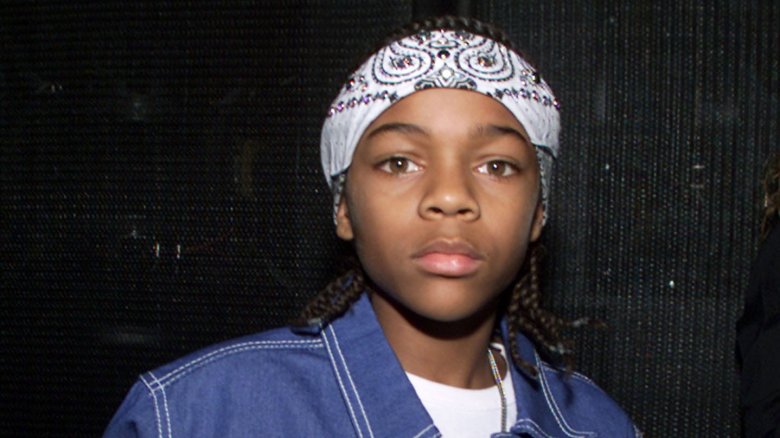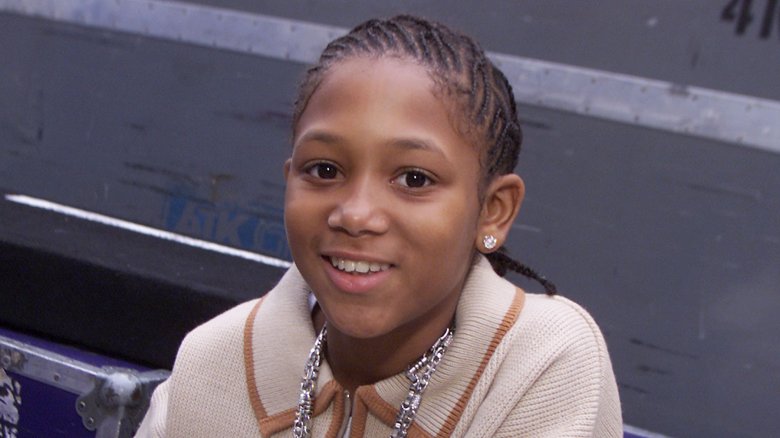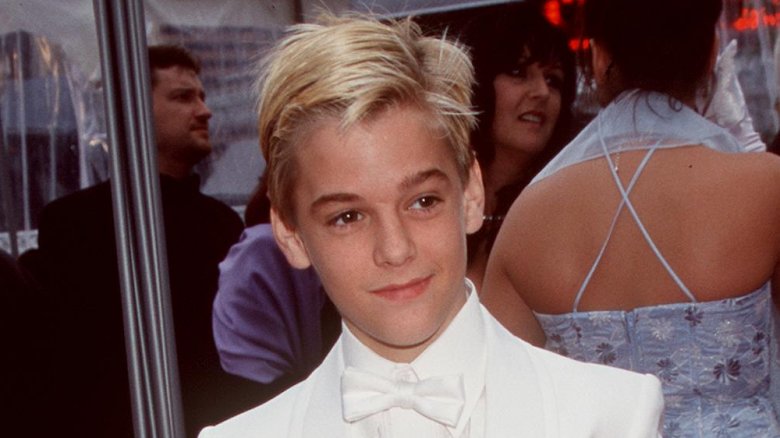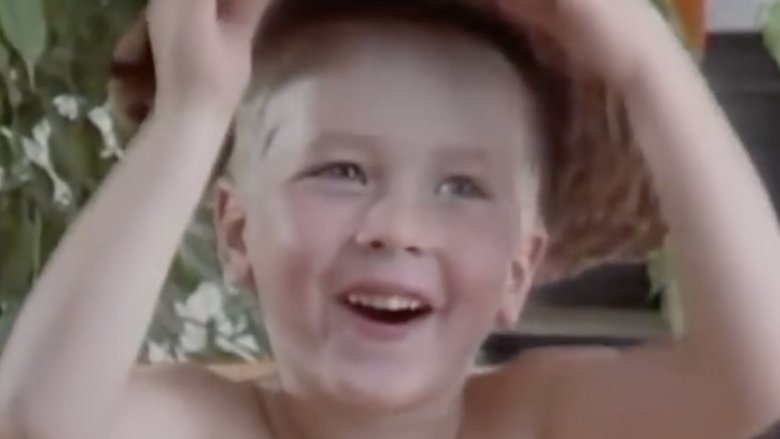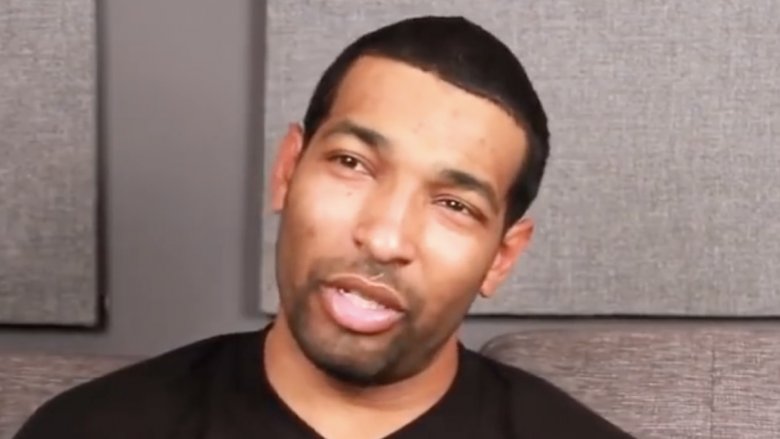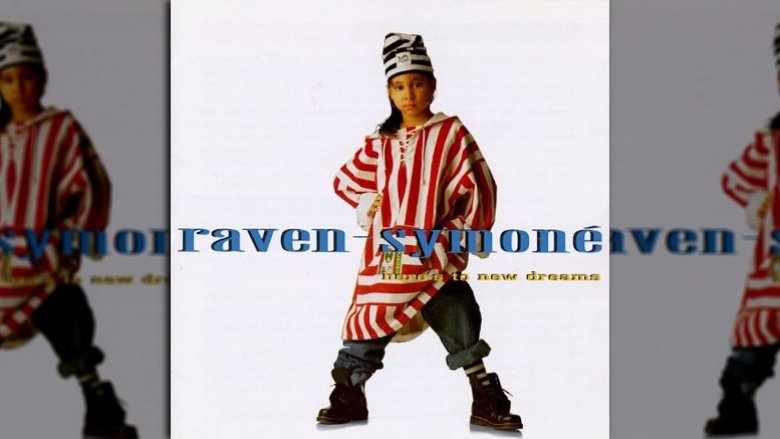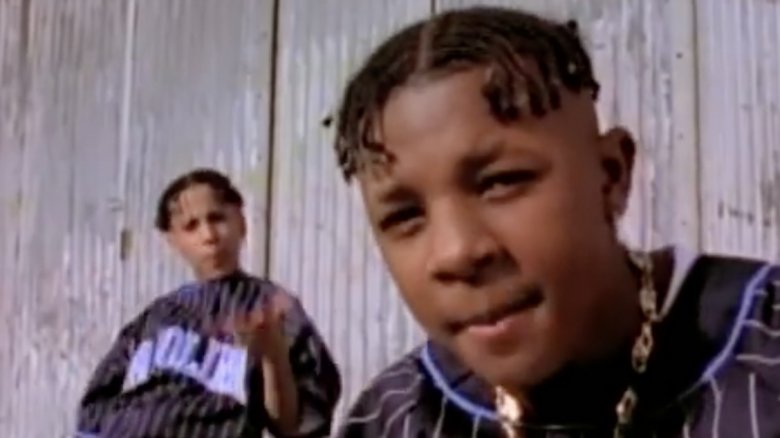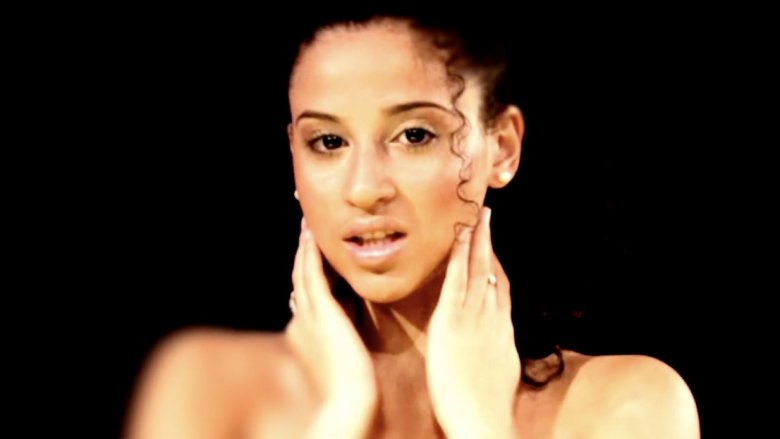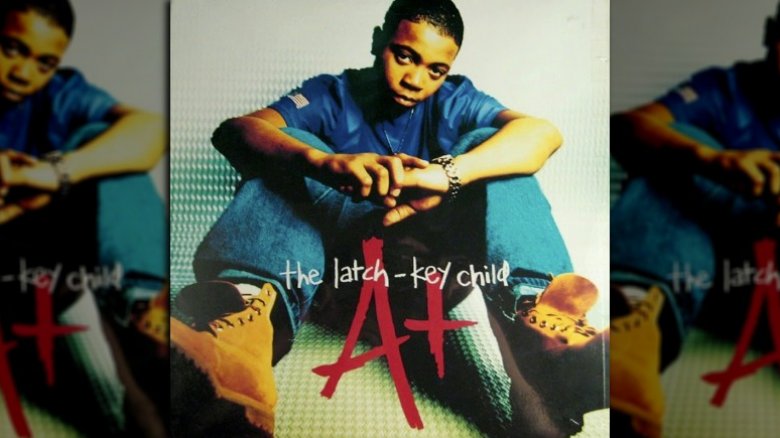The Real Reason You Don't Hear About These Child Rappers Anymore
When rap and hip-hop culture first emerged in the late '70s and early '80s, it was something of a novelty — men and women from New York looked really cool in their cool clothes talking in rhythm to the grooves from old funk records about their lives, and how delightful it was to rap ("Rapper's Delight" only). But then, as the genre matured and aged, new kinds of rap developed — harder-edged, politically-oriented and gangster rap, from groups such as Public Enemy and N.W.A., respectively. Both trajectories made rap absolutely irresistible to kids — that's what's going to happen with music that's both extremely catchy and that also seems a little bit dangerous.
That means that since almost the emergence of rap, there have been kids, tweens, and teens who successfully made a go at hip-hop. But what happened to them once everybody got over the novelty of a child performing grown-up music ... or the child became a grown-up? Read on to learn about the adult lives of some major former kid rappers.
Wow, Bow Wow, wow
While many child stars have a hard time transitioning to adulthood, Lil Bow Wow (or Shad Moss) seemed to adapt quite well. His first five rap albums all reached the top 20 of the Billboard 200, and he consistently scored on the pop chart throughout the 2000s, with songs like "Bounce with Me," "Like You," and "Shortie Like Mine." A popular presence with fellow teens (the rapper was 11-years-old when he scored his first hit song), Bow Wow started to show up in movies, such as Like Mike, Johnson Family Vacation, and Roll Bounce.
While his professional life has proved innocuous, Bow Wow (he dropped the "Lil" long ago, because he's an adult) causes the occasional stir on Twitter. In 2017, after President Donald Trump criticized Snoop Dogg's video "Lavender," which included a sequence of the rapper shooting a clown dressed like the Commander-in-Chief, Bow Wow took to Twitter, threatening to "pimp" the First Lady "and "make her work for us." (The tweet was soon deleted.)
According to Highsnobiety, in 2018, Bow Wow went on a profane rant against a fan who accused him of adultery. Then he threatened to give up his career in entertainment to go "work at a GameStop," but not before promising to give away his money to random people. He actually gave $500 to a guy named Todd, so, that shows you, internet stranger who accused Bow Wow of cheating.
Wherefore art thou, Lil' Romeo?
Right around the time of his 12th birthday, Lil' Romeo released his debut album on No Limit Records, the millennium-era rap juggernaut that produced stars like Master P, Silkk the Shocker, and C-Murder. How on Earth did a tween land a deal with one of the hardest labels in the game? It may have had something to do with the fact that Lil' Romeo's father is Master P, founder of No Limit Records. Nevertheless, if Lil' Romeo didn't have any talent, his first single would've died on the vine, and it definitely did not do that. The rapper's "My Baby" hit #3 on the pop chart. But despite a few more popular albums, the young man born Romeo Miller never had another solo track enter the Billboard Hot 100.
But that's okay, because he had other interests, particularly basketball. As a standout for Beverly Hills High School, he won a three-point competition over future NBA MVP James Harden and averaged 13.9 points during his junior year. He then moved on to USC, where he played for two years alongside his friend and future NBA star DeMar DeRozan.
Miller also seemed to inherit his father's entrepreneurial spirit. In 2011, he re-launched No Limit Records as a digital label called No Limit Records Forever.
Aaron's party got out of hand
As if one young, blond, fresh-faced idol named Carter wasn't enough for the American people in the early 2000s — Backstreet Boys heartthrob Nick Carter — along came his little brother, Aaron Carter. But while the elder Carter sang songs of love gained and lost, the younger rapped, and about subjects tweens were interested in: parties and basketball. Carter's two biggest hits: "Aaron's Party (Come Get It)" and "That's How I Beat Shaq." By the age of 15, Carter had released four albums of pop-rap (and vocal pop), which is about when the attention began to dry up. Carter segued into stuff like theater (the Dr. Seuss-based Broadway musical Seussical) and reality TV (Dancing with the Stars).
It was after the latter when his life started to careen out of control, he reported on an episode of Oprah: Where Are They Now. He thought his 2009 appearance on DWTS would trigger a comeback, and despite some meetings with producers, "nothing ever came to fruition," Carter said (via People). He got so depressed he turned to alcohol to cope, and in 2011, checked himself into rehab. In 2017, Carter was arrested for driving under the influence and marijuana possession, leading to another stint in a treatment center. More recently, things are looking up, with a new album in 2018 called LøVë.
Dur dur d'être Jordy!
One of the youngest people to ever have a hit record, Jordy was a four-year-old French kid who topped the charts in multiple countries, according to All Music. He even reached #58 on the Billboard Hot 100 in the U.S. with a song in his native tongue, "Dur dur d'être bébé!" (That translates to "It's Hard to Be a Baby.") The 1992 song is still one of the most successful singles ever in France, although that's not true for Jordy's next single, "Alison."
Jordy was so young and, obviously, new to music, that his parents were pulling the strings somewhat — his father was a successful producer, and his mother a singer and a songwriter. All Music also reported that the French government was concerned that Jordy was being financially "exploited" by his parents, and as a way to stop them in their tracks, "banned [Jordy's] music from the radio and television."
Undeterred, Jordy's parents opened a small amusement park for kids in 1996 called Jordy's Farm (or La Ferme de Jordy for the francophone readers). It lost a ton of money, quickly shut down, and the parents split up. Jordy fought for and received legal emancipation and moved to a (real) farm, where he studied music. In 2005, he moved to a third farm, according to Buzzfeed, although that was for a celeb-reality TV show called La Ferme Célébrités, Other than that, Jordy formed a very early-2000s pop rock band called Jordy and the DIxies.
The terrible choices of the Fabulous Chi-Ali
Sixteen-year-old rapper Chi-Ali scored a top 10 rap hit in 1992 with "Age Ain't Nothing But a #." (It was the '90s, so # meant "number," and not "hashtag.") Chi-Ali, also known as the Fabulous Chi-Ali (real name: Chi-Ali Griffith) notched a couple more solo hits before he could vote, and he was also a part of the Native Tongues, a loose affiliation of proponents of the era's "Afrocentric" hip-hop movement that also included A Tribe Called Quest and De La Soul.
The future looked very bright, and/or fabulous, for Chi-Ali indeed ... until a dark and ugly incident went down in the Bronx in 2000. Chi-Ali shot and killed a man named Sean Raymond, and then went on the run. After avoiding capture for over a year — and being featured on America's Most Wanted — police nabbed Chi-Ali. He agreed to a plea deal, accepting a lesser charge of first-degree manslaughter instead of homicide. In 2012, he was released from prison, a remorseful but changed man. "I took a life, and you can't take that back, so that's probably the worst thing one can do," he told RapFix Live (via MTV). "I committed a crime that I wish I could go back in time and undo. However, I can't, and you have to live with your mistakes and learn." Here's hoping he'll get back to music, too.
Having a hit at age 8 is so Raven
Raven-Symoné joined the cast of The Cosby Show in 1989 at just three-years-old, portraying Olivia Kendall, Denise Huxtable's cute (but not cloying) step-daughter. That series wrapped in 1992, and the one we today simply call Raven was never out of the spotlight for long. She turned out to be a legitimately funny comic actor, anchoring the Disney Channel sitcom That's So Raven from 2003 to 2007, portraying a psychic teenager prone to pratfalls and dumb behavior. Disney rebooted the show in 2017 as Raven's Home, wherein her character (also named Raven) is mom to a couple of tweens. In between psychic sitcom portrayals, Raven took on other acting work (such as the ABC Family sitcom State of Georgia) and served, as seemingly everybody does, eventually, as a panelist on The View.
With all of those resume points, it's easy to forget that Raven-Symoné also enjoyed a moderately successful music career back in the early 1990s. Her single "That's What Little Girls Are Made Of" squeaked into the top 40 in the summer of 1993, when Raven was seven-years-old. And she had some flow, too, bearing an aural resemblance to Lisa "Left Eye" Lopes of TLC. (Raven actually learned from the best — the song was written and produced by Missy Elliott.)
Kris Kross reunites, then tragedy strikes
Discovered at an Atlanta mall by producer Jermaine Dupri, Kris Kross hit #1 on the pop chart in 1992 with their first single, "Jump." It implored listeners to jump in a dance-like way, while also introducing the two members of Kris Kross: the Daddy Mac, and the Mac Daddy. A primer: Chris Smith was the Daddy Mac, and Kelly the Mac Daddy, and both were 13-years-old when "Jump" topped the charts, and when the duo's unique style of dress briefly led a nation of children to wear their clothes backwards. After "Jump," Kris Kross scored a string of hits, though none as big as "Jump," including "Warm It Up," "I Missed the Bus," the dancehall-flavored "Alright," and the 'bout-to-get-it-on jam "Tonite's the Night," which came in 1995, when both the Daddy Mack and the Mack Daddy were approaching voting age.
After releasing their last album together in 1996, Young, Rich, and Dangerous, Smith and Kelly parted ways, but reunited for a one-night-only show in February 2013 as part of the 20th anniversary party of Dupri's So So Def Recordings, according to CNN. Just a few months later, on May 1, 2013, Chris "the Mac Daddy" Kelly, "was found unresponsive at his home" and later died at a hospital in Atlanta. A medical examiner determined the cause of death to be a fatal combination of heroin, cocaine, alcohol, prescription painkillers, and Xanax.
P-Star rose
Like a real-life version of 8 Mile that isn't about Eminem, Priscilla Diaz, a.k.a. P-Star, first got attention for her rap skills when she got the guts to go up onstage at a New York club. Like B-Rabbit, P-Star was looking to rise above a troubled home life — her mother was a heroin addict, and her father struggled to keep the family out of poverty. Also, she was only nine-years-old at the time. P-Star was discovered performing by filmmaker Gabriel Noble, who followed her and her family for four years, crafting a documentary called P-Star Rising that aired on PBS's Independent Lens to wide attention and acclaim. The documentary depicted the young rapper scoring a record deal, which culminated in the 2008 album Welcome to My Show, released when P-Star was 14-years old.
While P-Star's rap career didn't last for the long term, her plans to use rap to get herself and her family ahead definitely worked. She scored a role on PBS's revival of The Electric Company, and in 2015 she took a break from entertainment to attend college at Denison University.
A+ for effort
In 1995, 12-year-old rapper Andre Levins, or A+, won a nationwide talent contest sponsored by Def Jam Recordings. A year later, he released his first album, The Latch Key Child. While just 13-years-old at the time, A+ was good enough to attract some high-level guest spots to The Latch Key Child, with both Prodigy from Mobb Deep and Q-Tip from A Tribe Called Quest checking in to spit a few lines.
A+ enjoyed some minor hits with "All I See," which hit #66 in 1996, and "Enjoy Yourself," topping out at #63 in 1999. That came from the rapper's follow-up, Hempstead High, which would prove to be his last musical effort for awhile. "I had a few family issues and I had a son" who was born in 2001, A+ told Hip Hop Wired. "So I sat back and decided to raise my son and become a family man and the music business was just so crazy with me coming onto it at an early age. A lot of business things and things from that aspect got a little out of control so I had to reassess my career."
Reassess he did, and in 2009 and 2012, he released a couple of singles to little attention: "Who Stole Hip-Hop" and "I'm Right Here." Ah, so that's where he is.

